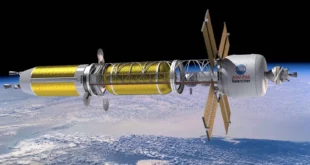
On 6 April 2020, US President Donald J. Trump signed an Executive Order (EO) on Encouraging International Support for the Recovery and Use of Space Resources. This order addresses US policy regarding the recovery and use of resources in outer space, including the Moon and other celestial bodies. Over the next few weeks, SpaceWatch.Global will publish a range of perspectives supporting and opposing the EO from experts around the world. Today’s three expert perspectives come from Sebastien Moranta of the European Space Policy Institute (below), Professor Alice Gorman of Australia (see here), and Michelle Hanlon of For All Mankind (see here).
In your opinion, what is the underlying strategic and economic rationale for President Trump’s Executive Order?
This Executive Order is yet another milestone in the unfolding U.S. National Space Strategy of the Trump administration. The United States, at least the White House, have clear ambitions and plans for the space sector and the various Space Policy Directives and Executive Orders adopted over the last few years are as many steps of a consistent and persistent implementation of these plans.
Here also, the U.S. National Space Strategy is a good starting point to understand the rationale behind this Executive Order and the language used already in 2018 leaves little room for interpretation: “we will streamline regulatory frameworks […] to better leverage and support U.S. commercial industry and we will pursue bilateral and multilateral engagements to enable human exploration”.
The Order falls within the objective to remove, or in this case avoid, regulatory roadblocks ahead of the U.S. space exploration program. Current plans imply to make use of space resources to enable future missions, starting with a sustainable presence on the Moon, but also to give a more prominent role to the private sector. The main objective of the Order is therefore to ensure a conducive environment for space resources exploitation, including for business purposes, be it in the frame of public-private partnerships or to address commercial markets. As a result, the White House ambitions to facilitate the involvement of private companies and to foster business development in the field of space resources exploitation, possibly as one of the main pillars of a “lunar economy”.
Another important objective of the Executive Order is to encourage international support and to negotiate joint statements and bilateral and multilateral arrangements with foreign states. Here, and comparably to the posture adopted in other domains such as Space Traffic Management, the White House seeks leadership on the global scene through national initiatives expected to stimulate international discussions and establish the U.S. posture as a norm against which other countries would have to position themselves. Here again it is important to recall that this posture fits in the “America First” policy of the Trump administration. The U.S. National Space Strategy already made clear that international agreements should put the interests of American people, workers, and businesses first.
The Executive Order explicitly rejects the 1979 Moon Agreement. How do you think this will be received by other countries, particularly other major space powers?
I do not expect major international reactions on this specific point of the U.S. Executive Order. Even though it is the first time that a U.S. administration takes an official position on the validity of the 1979 Moon Agreement outside diplomatic circles, the position itself is not a novelty.
The United States have neither signed nor ratified the Moon Agreement, like many other spacefaring nations actually. In this context, most specialists consider the Moon Agreement as an ill-fated piece of international legislation but also tend to agree that this does not necessarily preclude its validity and legal effect since the treaty officially entered into force in 1984. Yet, the Moon Agreement explicitly constrains the exploitation of natural resources on the Moon and conditions it to the establishment of an international regime to govern such activities. The United States already adopted policies in contradiction with the provisions of the Moon Agreement (and with the Outer Space Treaty some would argue) such as the SPACE Act of 2015 which allows U.S. citizens to engage in commercial recovery and use of space resources, The question of the legal effect of the Moon Agreement is a controversial topic, even among top space law specialists.
Nevertheless, the Agreement casts a shadow on the legality of the activities that the U.S. governments wants to promote with this Executive Order. From this standpoint, it could be argued that denouncing the validity of the Moon Agreement may actually be necessary for the United States to deal with the matter, at least from a diplomatic perspective. Anyhow, this point will certainly feed interesting debates among space law experts.
Similarly, the Executive Order explicitly rejects the view that space is a Global Commons. What, in your opinion, is the policy rationale behind this claim and, again, how do you think this will be received by other countries?
This statement, on the other hand, will likely trigger some strong reactions from the international community as it implies a specific interpretation of the Outer Space Treaty, which has been ratified or signed by 109 countries.
At the IISL Galloway Space Law Symposium in 2017, Dr. Scott Pace, Executive Secretary of the U.S. National Space Council, already declared that “outer space is not a ‘global commons,’ not the ‘common heritage of mankind,’ not ‘res communis,’ nor is it a public good” explaining that these concepts were not part of the Outer Space Treaty and recalling that the United States had consistently taken the position that these ideas do not describe the legal status of outer space. Indeed, the United States have repeatedly taken position against multilateral frameworks that may constrain U.S. activities or impede U.S. vested interests, not only in the outer space domain but in other fields of international law as well.
Russia already reacted strongly to this statement and more will certainly follow. Even though this position is not new, it has implications beyond the sole issue of recovery and use of space resource and opens up new perspectives on what can be done or not in outer space. Countries will want to examine this point and its potential implications in other areas of space activities, in particular if this principle is called to lay the foundations of the bilateral and multilateral arrangements that the United States wants to negotiate.
In your view, how likely will this Executive Order “encourage international support for the public and private recovery and use of resources in outer space…?”
The exploitation of space resources, in particular in-situ, will be necessary for various activities related to future space exploration missions such as life support, power generation or even the production of propellant or replacement parts. I think there is a consensus on this: difficult to imagine a mission to Mars without a full mastery of in-situ resource utilization techniques. This entails the development and demonstration a number of technologies, which is one of the objectives of the Artemis program that the United States want to conduct in cooperation with international partners and the private industry.
The international dimension of the program urges for reaching a consensus on the legality of space resource exploitation, at least among the partners involved. Here again, difficult to imagine a situation where American and European agencies and companies would have different rights regarding the recovery of resources and, even worse, different rights for the use of these resources. No need to elaborate of the tensions that such situation would lead to. International partners will therefore need to converge on a common set of rules and principles governing the use and recovery of resources on the Moon and to fill in the gaps existing in the current international space legal regime.
With this Executive Order the White House put on the table the high-level principles that will shape the U.S. approach to the issue. This will unquestionably prompt international discussions but it is difficult to anticipate how foreign countries and in particular Artemis partners will react. The SPACE Act of 2015, which may give a more precise idea of what the U.S. government has in mind, did not really receive a consensual support at the time, even from close partners. Of course, the situation is very different now and the steady progress of the Artemis program is definitely making the issue more pressing. Ultimately, the negotiations of these bilateral and multilateral arrangements will have to account for both diplomatic and programmatic perspectives.
Hypothetically assuming that this Executive Order leads to international support, will it make the prospect of commercial space resource extraction closer to reality?
The Executive Order has the merit of clarifying the position of the United States regarding the legality of space resource extraction and of showing the great ambitions that the U.S. government has in this domain, in particular with regards to the development of commercial options. This will definitely have a positive impact for business in this field as it provides a more fertile ground for commercial endeavors and some solid arguments for investment. Now, developing viable technical solutions and a profitable business model not only to support space exploration missions but also to serve markets on Earth is still a (very) long shot. The Executive Order may, however, make it a little closer to reality by offering a concrete first step for companies to envision commercial offers.

Sebastien Moranta is Coordinator of Studies at the European Space Policy Institute (ESPI) in Vienna, an independent and public think-tank providing decision-makers with an informed view on short to long-term issues relevant to the European space policy. Prior to supervising the research activities of the Institute, he was a Senior Associate at PricewaterhouseCoopers Advisory where he managed multiple studies for public and private space sector stakeholders. Former analyst at Eurospace, the association of the European space industry, he has worked on various space strategy and policy issues.





